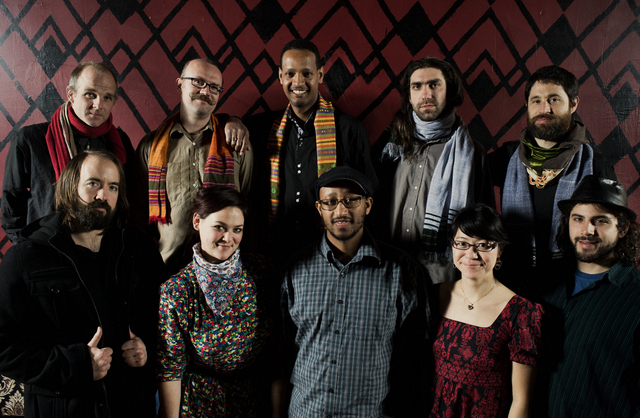 Debo Band is an 11-member Boston-based group led by Ethiopian-American saxophonist Danny Mekonnen and fronted by vocalist Bruck Tesfaye. (Courtesy Photo)
Debo Band is an 11-member Boston-based group led by Ethiopian-American saxophonist Danny Mekonnen and fronted by vocalist Bruck Tesfaye. (Courtesy Photo)
Tadias Magazine
By Tadias Staff
Updated: Friday, July 6, 2012
New York (TADIAS) – In its recent, thumbs-up highlight of Debo band’s self-titled first album NPR noted: “The particular beauty of Debo Band is that you don’t have to be an ethnomusicologist to love it: It’s all about the groove. Debo Band transforms the Ethiopian sound through the filter of its members’ collective subconscious as imaginative and plugged-in 21st-century musicians. Klezmer-haunted wails dart in and out between disco thumps. The swooning, hot romance of [Yefikir Wegene] bursts up from the same ground as the funky horns of Ney Ney Weleba. From that hazy shimmer of musical heat from faraway Addis, a thoroughly American sound emerges.”
In an interview with Tadias Magazine, Danny Mekonnen, the group’s Ethiopian-American founder, agreed with NPR’s description, yet also pointed out that even he finds it difficult to explain the music. “It’s funny now that I am talking to the press more and more I am asking myself the same question”, Danny told TADIAS. “What is it?,” he said, admitting that he is not sure how he would categorize Debo’s music genre.
“I don’t think its Ethio-jazz because to me Ethio-jazz is a very specific thing branded by Mulatu Astatke. Its gentle,” he said. “Initially I didn’t want to start an Ethio-jazz band because I was interested in a lot of different things and influenced by unapologetic funk music as well, such as someone like Alemayehu Eshete, which is really about groove, dancing, and strong lyrics. That kind of energy.”
Debo’s debut album features originals, such as DC Flower and Habesha, the latter based on the Diaspora experience where a young man is mesmerized by an attractive East African woman walking down the street that could be either Ethiopian or Eritrean, while the former is an instrumental giving prominence to Embilta flutes and traditional drums. “The two songs are noteworthy because we are carving our space as a Diaspora, Ethiopian-American band,” Danny said.
Danny, who holds a Master’s degree in Ethnomusicology from Harvard University, said he became exposed to Ethiopian music at an early age while growing up in Texas, mostly from his parents cassette-tape collections of old songs from the 1960′s and 70s. “I was just soaking it up like a sponge,” he said. “I was attracted to it because of its horn melodies and its closeness to American jazz.” He continued: “Later, in the early 2000′s I was introduced to the Éthiopiques CD series, which gave me really accessible context including photos. That also led me to meet some great people in the Diaspora. So when I entered Harvard I had already started Debo band and my scholarly focus was on Ethiopian music.”
Even though Debo’s sound is heavily indebted to the classics of the 1960′s and early ’70′s, Danny said he is sympathetic to those who say the overwhelming focus on that era alone undercuts the contributions of subsequent generations of Ethiopian musicians. “Unfortunately the focus on the so called ‘Golden Age of Ethiopian music’ sort of discredits what came after it,” he said. “For example, if you listen to Teddy Tadesse’s Zimita album, that was a pretty heavy record, very progressive, and at least ten years ahead of its time. You can hear its influence in singers that came later like Gossaye and Teddy Afro.” He added: “Zimita was entirely arranged by Abegaz Shiota. Abegaz and bass guitarist Henock Temesgen are two of the many contemporary Ethiopian musicians that I have the highest respect for. They were part of Admas Band that worked with everyone from Aster Aweke to Tilahun Gessesse and Mahmoud Ahmed.”
Danny said his friend Charles Sutton, Jr. – the Peace Corps volunteer who in 1969 arranged for Orchestra Ethiopia, then led by Tesfaye Lemma, to tour the United States under the name “The Blue Nile Group” – was also instrumental in helping him to connect with older Ethiopian musicians in the U.S. “Charlie arranged for me a private lesson with Melaku Gelaw, one of the top washint and kirar players of that generation,” Danny said.
According to Danny, Mr. Sutton was also responsible for suggesting the name “Debo” as the group’s identity. “I told Charlie I was searching for a band name and he spoke to an Ethiopian lady friend of his and she came up with the word,” Danny shared.
“Debo means communal labor or collective effort in Amharic” Danny said. “An easy word to pronounce for non-Ethiopians, short four-letter word and very simple. But it also strikes up a fun conversation among Ethiopians because it’s an old archaic word and not part of their daily usage.”
“Ethiopians tell me that it sounds like Dabo (bread),” Danny said laughing.
—
If You Go:
Debo Band is getting ready for their CD release tour starting next week and will be performing at The Bell House in Brooklyn, the U Street Music Hall in Washington D.C. as well as at the renowned Philadelphia Folk Festival in Schwenksville, PA. For a detailed listing of their upcoming tour please visit Debo Band’s website. You can learn more about Debo’s new album and pre-order at www.subpop.com.
Watch: Debo Band Live (NPR)
–
Related:
Golden Age Pop – from Ethiopia (WNYC)


























Great music. Good luck Danny
Dawit
very nice!!